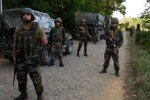HT Digital
IMPHAL, MAY 6: The Supreme Court on Monday raised serious concerns over the authenticity of a sealed cover report submitted by the Union government regarding leaked audio tapes allegedly involving former Manipur Chief Minister N. Biren Singh. The tapes purportedly contain admissions by Singh indicating that the ethnic violence in Manipur may have been instigated under his direction.
In a significant development, the apex court directed the government to ensure that the Central Forensic Science Laboratory (CFSL) conducts a fresh, independent analysis of the audio recordings and submits a reliable report.
A bench comprising Chief Justice Sanjiv Khanna and Justice Sanjay Kumar stated clearly that the existing forensic report lacked credibility. The judges, after examining the sealed cover, questioned the authenticity of its contents and expressed dissatisfaction with the government’s submission. Addressing Solicitor General Tushar Mehta, the bench remarked, “What is this? You need to speak with your officers. Go through the content and then respond accordingly. Please review and file a new report.” The court’s remarks underscored its firm stance that no individual, regardless of position, is above scrutiny.
Solicitor General Mehta admitted that he had not reviewed the report himself and was therefore unable to comment on it. The court reiterated the need for transparency and accountability, especially given the sensitive nature of the case, which involves allegations tied to communal violence and loss of life.
The hearing was in response to a petition filed by the Kuki Organisation for Human Rights Trust, represented by senior advocate Prashant Bhushan. The petition urges the Supreme Court to supervise a Special Investigation Team (SIT) probe into the contents of the leaked audio tapes, which allegedly implicate the former Chief Minister in inciting clashes between the Meitei and Kuki communities.
The ethnic violence that erupted in Manipur in May 2023 and persisted until February 2024 claimed over 230 lives and displaced thousands. The Supreme Court’s directive for a renewed forensic analysis reflects a commitment to ensuring an impartial and thorough investigation into one of the most serious communal conflicts in recent history.
By calling for a new forensic examination, the court has sent a strong message underscoring the importance of justice, transparency, and the rule of law—even in politically sensitive and volatile cases. The CFSL’s upcoming report could prove pivotal in shaping the legal and political outcomes of the controversy.












